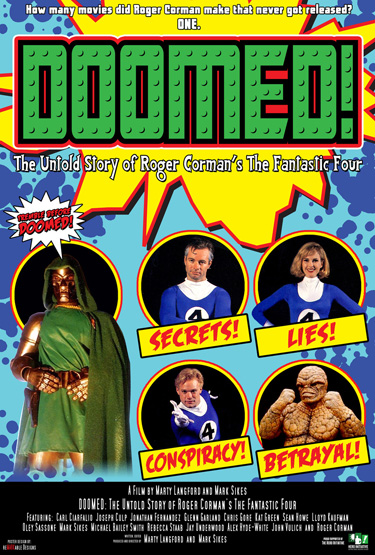
As crazy as it sounds, there was a time when Marvel didn’t mean instant box office gold. Long before The Avengers became one of the highest grossing movies of all time, Howard the Duck was the first Marvel character to receive a feature film and bombed on an epic level. The Punisher, with Dolph Lundgren and no trademark skull, and Captain America, starring J.D. Salinger’s son Matt, both went straight to video. At least, they were released, which was more than could be said for The Fantastic Four.
We’re not talking about the version with Jessica Alba and Chris Evans or even the reboot directed by Josh Trank, this was the low budget production from B-movie impresario Roger Corman. His Fantastic Four never made it to theaters or received an official home video release. The only way for anyone, including the actors, to see the final product was to buy a bootleg VHS at comic book conventions.
Director Marty Langford investigates the circumstances surrounding the genesis of The Fantastic Four and how it was ultimately torpedoed in his documentary, Doomed: The Untold Story of Roger Corman’s the Fantastic Four.
It all started when producer Bernd Eichinger and his production company Constantin Films optioned the rights to make a movie based on the Fantastic Four. Eichinger originally approached Lloyd Kaufman of Troma Entertainment before striking a deal with Corman to produce a picture budgeted at one million dollars. Oley Sassone, who went on to direct TV shows like Hercules, Xena & Mutant X, was hired to helm The Fantastic Four. Alex Hyde-White and Joseph Culp were cast as Reed Richards and his arch-nemesis Victor Von Doom with soap opera starlet Rebecca Staab as Susan Storm and Jay Underwood, of Disney Channel fame, was selected to play the Human Torch. British thespian Ian Trigger was cast as secondary villain, The Jeweler, a knockoff of the Mole Man whose rights were not a part of the deal. Some of the surprising names that auditioned included Mark Ruffalo and Patrick Warburton
Before production began, Sassone and his effects department immediately went to work on creating a costume for The Thing fitted for stuntman Carl Ciarfalio. Ironically, the actor hired to play Benjamin J. Grimm, Michael Bailey Smith, was much taller than Ciarfalio. Thus, the team’s bruiser was actually smaller than his human incarnation. It was one of many quirks that have become trademarks of a Corman production. Sets and props were recycled from other features like Carnosaur. Visual effects were even more substandard than usual thanks to an effects artist who padded out his resume.
While post-production commenced, the cast took it upon themselves to promote the upcoming flick by making appearances at San Diego Comic-Con and HeroesCon in North Carolina. All travel expenses and promotional materials were paid for on their own dime to hype a movie that was never intended to be released.
Cast and crew believed Eichinger only produced The Fantastic Four as a loophole to retain the rights and eventually resell them to Fox. Word going around was that Chris Columbus, hot off Home Alone, was a fan and looking to adapt the property himself. For his part, Corman was reimbursed the $1 million though he remains coy about how much he truly knew. Ironically, it was over a decade for Fox to finally release their big-budget version, which was met with mixed reviews. The sequel, Rise of the Silver Surfer, was derided for its portrayal of Galactus as a giant cloud. Trank’s attempt became more infamous for its behind-the-scenes turmoil than anything put on the silver screen. If anything, the ’94 Fantastic Four featured the most faithful rendition of Doctor Doom, depicting him as a megalomaniacal dictator of Latveria rather than a generic baddie with lightning powers.
It’s a shame Langford wasn’t able to get both sides of the story. Stan Lee and Avi Arad, producer of dozens of Marvel films, declined to be interviewed along with any representative from Marvel or Fox. Those who did participate are very open about their experiences and disappointment with how everything ended.
Doomed may not be a hard-hitting exposé, but the doc is a fun look at an era when comic book movies had yet to ascend to the firmament of pop culture.
Film Rating: 6/10

